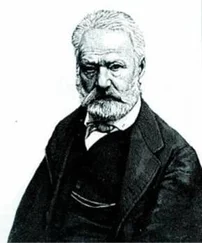Victor Hugo - Les Misérables, v. 3
Здесь есть возможность читать онлайн «Victor Hugo - Les Misérables, v. 3» — ознакомительный отрывок электронной книги совершенно бесплатно, а после прочтения отрывка купить полную версию. В некоторых случаях можно слушать аудио, скачать через торрент в формате fb2 и присутствует краткое содержание. Жанр: literature_19, foreign_antique, foreign_prose, на английском языке. Описание произведения, (предисловие) а так же отзывы посетителей доступны на портале библиотеки ЛибКат.
- Название:Les Misérables, v. 3
- Автор:
- Жанр:
- Год:неизвестен
- ISBN:нет данных
- Рейтинг книги:4 / 5. Голосов: 1
-
Избранное:Добавить в избранное
- Отзывы:
-
Ваша оценка:
- 80
- 1
- 2
- 3
- 4
- 5
Les Misérables, v. 3: краткое содержание, описание и аннотация
Предлагаем к чтению аннотацию, описание, краткое содержание или предисловие (зависит от того, что написал сам автор книги «Les Misérables, v. 3»). Если вы не нашли необходимую информацию о книге — напишите в комментариях, мы постараемся отыскать её.
Les Misérables, v. 3 — читать онлайн ознакомительный отрывок
Ниже представлен текст книги, разбитый по страницам. Система сохранения места последней прочитанной страницы, позволяет с удобством читать онлайн бесплатно книгу «Les Misérables, v. 3», без необходимости каждый раз заново искать на чём Вы остановились. Поставьте закладку, и сможете в любой момент перейти на страницу, на которой закончили чтение.
Интервал:
Закладка:
Through his toil, perseverance, attention, and watering-pot, he had succeeded in creating after the Creator; and he had invented sundry tulips and dahlias which seemed to have been forgotten by nature. He was ingenious, and preceded Soulange Bodin in the formation of small patches of peat-soil for the growth of the rare and precious shrubs of America and China. From daybreak in summer he was in his walks, pricking out, clipping, hoeing, watering, or moving among his flowers, with an air of kindness, sorrow, and gentleness. At times he would stand thoughtful and motionless for hours, listening to the song of a bird in a tree, the prattle of a child in a house, or else gazing at a drop of dew on a blade of grass, which the sun converted into a carbuncle. He lived very poorly, and drank more milk than wine: a child made him give way, and his servant scolded him. He was timid to such an extent that he seemed stern, went out rarely, and saw no one but the poor, who tapped at his window, and his curé, Abbé Mabœuf, a good old man. Still, if the inhabitants of the town or strangers, curious to see his roses or tulips, came and tapped at his little door, he opened it with a smile. He was the brigand of the Loire.
Any one who, at the same time, read military memoirs and biographies, the Moniteur and the bulletins of the great army, might have been struck by a name which pretty often turns up, that of George Pontmercy. When quite a lad this Pontmercy was a private in the Saintonge regiment, and when the Revolution broke out, this regiment formed part of the army of the Rhine, for the regiments of the Monarchy kept their provincial names even after the fall of the Monarchy, and were not brigaded till 1794. Pontmercy fought at Spires, Worms, Neustadt, Turkheim, Alzey, and at Mayence, where he was one of the two hundred who formed Houchard's rear-guard. He, with eleven others, held out against the corps of the Prince of Hesse behind the old rampart of Andernach, and did not fall back on the main body until the enemy's guns had opened a breach from the parapet to the talus. He was under Kléber at Marchiennes, and at the fight of Mont Palissel, where his arm was broken by a rifle-ball; then he went to the frontier of Italy, and was one of the thirty who defended the Col de Tenda with Joubert. Joubert was appointed adjutant-general, and Pontmercy sub-lieutenant; he was by Berthier's side amid the grape-shot on that day of Lodi which made Bonaparte say, "Berthier was gunner, trooper, and grenadier." He saw his old general Joubert fall at Novi at the moment when he was shouting, with uplifted sabre, "Forward!" Having embarked with his company on board a cutter which sailed from Genoa to some little port of the coast, he fell into a wasps' nest of seven or eight English sail. The Genoese commandant wished to throw his guns into the sea, hide the soldiers in the hold, and pass like a merchant vessel; but Pontmercy had the tricolor flag hoisted at the peak, and proudly passed under the guns of the British frigates. Twenty leagues farther on, his audacity increasing, he attacked and captured a large English transport conveying troops to Sicily, and so laden with men and horses that the vessel's deck was almost flush with the sea. In 1805 he belonged to Malher's division, which took Gunzbourg from the Archduke Ferdinand, and at Wettingen he caught in his arms, amid a shower of bullets, Colonel Maupilet, who was mortally wounded at the head of the 9th Dragoons. He distinguished himself at Austerlitz in that admirable march in columns of companies performed under the enemy's fire; and when the Russian Imperial Horse Guards destroyed one of the battalions of the 4th line Infantry, Pontmercy was among those who took their revenge, and drove back these Guards. For this the Emperor gave him the Cross. Pontmercy saw in turn Wurmser made prisoner at Mantua, Mélas at Alessandria, and Mack at Ulm, and he belonged to the 8th corps of the grand army which Mortier commanded, and which took Hamburg. Then he joined the 55th regiment of the line, which was the old regiment of Flanders; at Eylau, he was in the cemetery where the heroic Captain Louis Hugo, uncle of the author of this book, withstood, with his company of eighty-three men, for two hours, the whole effort of the enemy's army. Pontmercy was one of the three who left this cemetery alive. He was at Friedland; then he saw Moscow, the Beresina, Lutzen, Bautzen, Dresden, Wacha, Leipsic, and the defiles of Gelnhausen; then at Montmereil, Château-Thierry, Craon, the banks of the Marne, the banks of the Aisne, and the formidable position of Laon. At Arnay le Duc, as captain, he sabred ten Cossacks, and saved not his general, but his corporal; he was cut to pieces on this occasion, and seven-and-twenty splinters were taken out of his left arm alone. Eight days before the capitulation of Paris he exchanged with a comrade and entered the cavalry; for he had what was called under the old régime a "double hand;" that is to say, an equal aptitude in handling, as private, a sabre or musket, as officer, a squadron or a company. From this aptitude, improved by military education, special arms sprang, for instance, the dragoons, who are at once cavalry and infantry. He accompanied Napoleon to Elba, and at Waterloo was a Major of cuirassiers in Dubois' brigade. It was he who took the colors of the Limburg battalion, and himself threw them at the Emperor's feet. He was covered with blood; for, on seizing the colors, he received a sabre-cut across the face. The Emperor, who was pleased, cried out to him, "You are a Colonel, a Baron, and officer of the Legion of Honor!" Pontmercy answered, – "Sire, I thank you on behalf of my widow." An hour later he fell into the ravine of Ohain. And now who was this George Pontmercy? He was the same brigand of the Loire.
We have already seen some portion of his history. After Waterloo, Pontmercy, drawn as we remember out of the sunken road of Ohain, succeeded in rejoining the army, and dragged himself from ambulance to ambulance as far as the cantonments of the Loire. The Restoration put him on half-pay, and then sent him to Vernon, under honorable surveillance. King Louis XVIII., regarding all that was done in the Hundred Days as if it had not happened, recognized neither his quality as officer of the Legion of Honor, nor his commission as Colonel, nor his title as Baron. He for his part neglected no opportunity to sign himself, "Colonel Baron de Pontmercy." He had only one old blue coat, and never went out without attaching to it the rosette of the Legion of Honor. The King's attorney advised him that he would be tried for illegally wearing this decoration; and when this hint was given him by an officious intermediator, Pontmercy replied, with a bitter smile, "I do not know whether it is I that no longer understand French, or whether you are not speaking it, but the fact remains the same: I do not understand you." Then he went out for eight days in succession with his rosette, and the authorities did not venture to interfere with him. Twice or thrice the Minister of War or the General commanding the department wrote to him with the following superscription: "M. le Commandant Pontmercy," and he sent back the letters unopened. At the same moment Napoleon at St. Helena was treating in the same fashion the missives of Sir Hudson Lowe, addressed to "General Bonaparte." If we may be forgiven the remark, Pontmercy finished by having the same saliva in his mouth as the Emperor. There were also at Rome, Carthaginian prisoners who refused to salute Flaminius, and had a little of Hannibal's soul in them.
One morning he met the King's attorney in a street of Vernon, went up to him, and said, "Monsieur le Procureur du Roi, am I allowed to wear my scar?"
He had nothing but his scanty half-pay as Major, and he had taken the smallest house in Vernon, where he lived alone, in what way we have just seen. Under the Empire and between two wars he found time to marry Mlle. Gillenormand. The old bourgeois, who was indignant in his heart, concluded with a sigh and saying, "The greatest families are forced into it." In 1815, Madame Pontmercy, a most admirable woman in every respect, and worthy of her husband, died, leaving a child. This child would have been the Colonel's delight in his solitude; but the grandfather imperiously claimed him, declaring that if he were not given up to him he would disinherit him. The father yielded for the sake of the little one, and, unable to love his son, he took to loving flowers.
Читать дальшеИнтервал:
Закладка:
Похожие книги на «Les Misérables, v. 3»
Представляем Вашему вниманию похожие книги на «Les Misérables, v. 3» списком для выбора. Мы отобрали схожую по названию и смыслу литературу в надежде предоставить читателям больше вариантов отыскать новые, интересные, ещё непрочитанные произведения.
Обсуждение, отзывы о книге «Les Misérables, v. 3» и просто собственные мнения читателей. Оставьте ваши комментарии, напишите, что Вы думаете о произведении, его смысле или главных героях. Укажите что конкретно понравилось, а что нет, и почему Вы так считаете.












